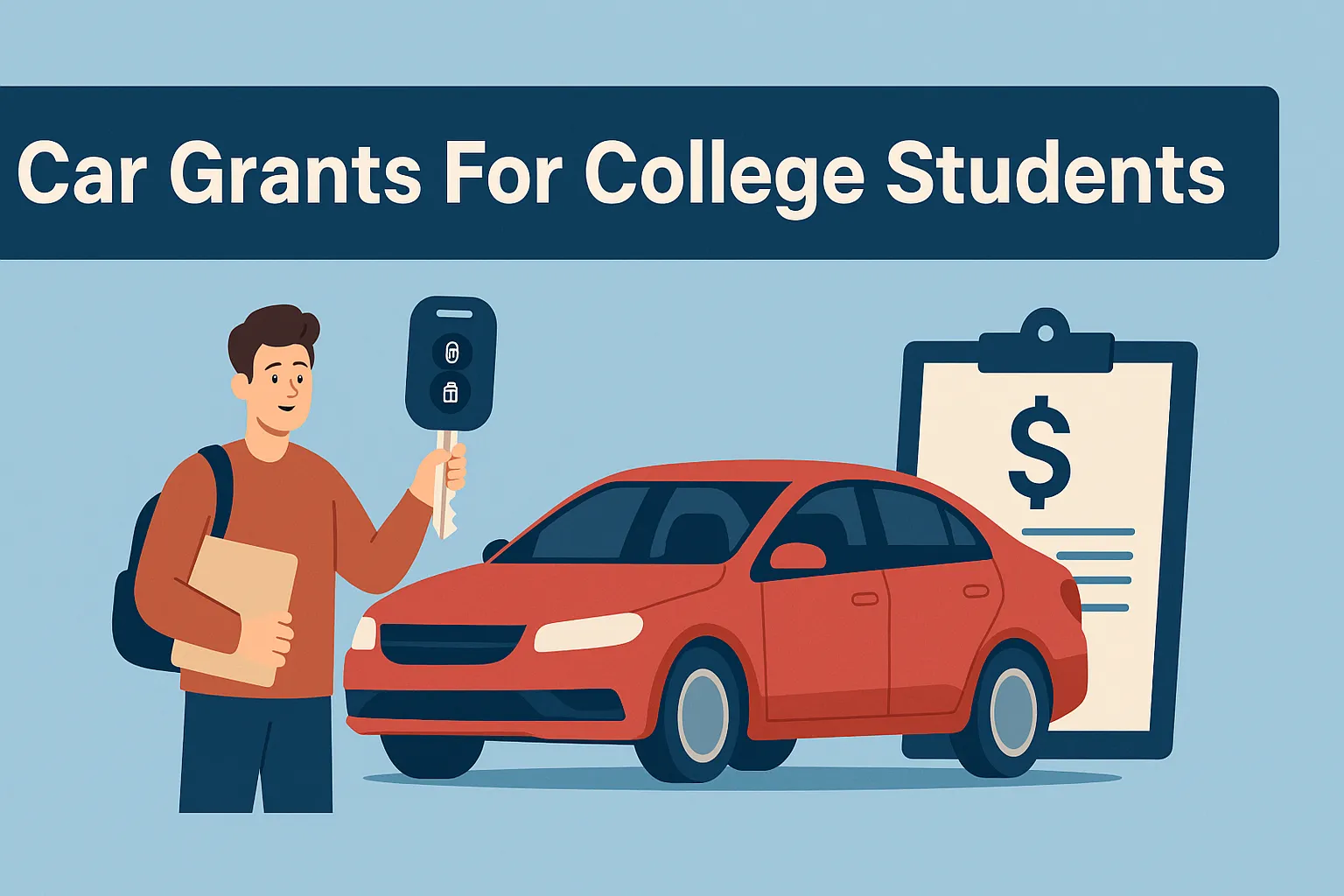Navigating college life can be challenging, especially when it comes to transportation. Imagine having the freedom to drive to campus without worrying about bus schedules or relying on others for rides.
Some charities and organizations provide free cars to students in need. This can be a game-changer for those who struggle to balance academics with the demands of daily life.

Having a reliable vehicle can significantly impact a student’s ability to succeed. The purpose of this article is to explore the various transportation assistance options available to college students, including car grants and free vehicles.
Key Takeaways
- Charitable organizations and government initiatives provide cars to eligible students.
- Reliable transportation can significantly impact academic success.
- Application processes and documentation requirements will be detailed.
- Tips to increase the chances of securing a car grant will be provided.
- Both national and state-specific programs will be highlighted.
- Understanding the difference between traditional scholarships and car grants is essential.
Understanding Car Grants and Why They Matter
For many college students, having a car is not just a convenience but a necessity that can significantly impact their academic success and overall college experience. Modern civilization values speed and agility in everything, including transportation; thus, cars are necessary. However, they can be high-priced luxury items, making them difficult to afford, especially for students.
The Transportation Challenge for College Students
Both undergraduate and graduate students face significant challenges commuting between home, campus, work, and internships, especially those attending schools in areas with limited public transportation options. The time spent navigating unreliable transportation systems can directly impact a student’s academic performance, work opportunities, and overall college experience. In fact, reliable transportation is often the missing link between academic potential and actual achievement for many students.
How Car Grants Differ from a Traditional Scholarship Fund
Car grants represent a specialized form of financial assistance designed specifically to address the transportation needs of college students. Unlike traditional scholarships that focus primarily on tuition and books, car grants provide direct access to a vehicle or funds specifically earmarked for transportation. Organizations offering car grants recognize that eliminating transportation barriers can make a substantial difference in a student’s life by providing independence, saving time, expanding job opportunities, and reducing stress.
By understanding the full spectrum of car grant programs available, students can identify which options best align with their specific situation and needs. These programs aim to eliminate transportation barriers that might otherwise force students to choose between education and employment.
Eligibility Requirements for Car Grants for College Students
To qualify for car grants, college students must meet specific eligibility requirements. These requirements are designed to ensure that assistance is provided to those who need it most.
Basic Qualifications You Need to Meet
Most car grant programs have specific eligibility criteria that applicants must meet before being considered for assistance. The basic qualifications typically include:
- Age requirements (usually 18 or older)
- Citizenship or residency status
- Possession of a valid driver’s license
- Enrollment verification at an accredited college or university
As an applicant, you should be prepared to provide documentation to support your eligibility. This may include proof of enrollment, academic transcripts, and identification documents.
Documentation and Proof Requirements
The application process generally involves submitting personal information, academic records, financial documentation, and often a personal statement explaining how a car would impact your educational journey. Some programs require references or nominations from academic advisors, community leaders, or social service agencies to verify the applicant’s character and genuine need.
| Documentation Type | Description |
|---|---|
| Proof of Enrollment | Verification of current enrollment at an accredited college or university |
| Academic Transcripts | Records of academic performance |
| Financial Records | Documentation of financial need, such as FAFSA results or tax returns |
| Identification Documents | Valid government-issued ID, such as a driver’s license |
By understanding the eligibility criteria and required documentation, you can better prepare yourself for the application process and increase your chances of securing a car grant.

Top Charitable Organizations Offering Free Cars to Students
Charitable organizations play a crucial role in supporting college students by providing them with free cars, thus fostering their academic success. These organizations understand the challenges students face with transportation and step in to help.
800-Charity Cars/Free Charity Cars
800-Charity Cars, also known as Free Charity Cars, is one of the oldest and most established organizations dedicated to providing vehicles to those in need, including college students struggling with transportation issues. Their program focuses on helping students achieve self-sufficiency through reliable transportation.

Car Angel
Car Angel is another charity that donates cars to those in need, including college students. They take donated vehicles, refurbish them, and give them to individuals who require reliable transportation, supporting various educational and religious programs.

Cars4Christmas
Cars4Christmas operates seasonally, providing substantial support to students facing transportation hardships, particularly during winter months when public transportation becomes less reliable. They give away cars during the holiday season to people in need.

Good News Garage
The Good News Garage, operated by Lutheran Social Services, has helped over 4,400 students by providing safe, reliable transportation options to low-income individuals pursuing higher education. They focus on refurbishing vehicles for those in need.

Purple Foundation
The Purple Foundation helps individuals and families in need by providing free cars. They evaluate applications based on need and potential impact, making it an excellent option for students who can clearly articulate how transportation challenges are affecting their academic performance.

Each of these organizations has its own application process but shares a common mission of removing transportation barriers for students committed to their education. They often prioritize students who are balancing work and school responsibilities, single parents pursuing degrees, or those with limited access to public transportation options.
Government Programs and Car Grants for College Students
Government initiatives play a crucial role in supporting college students by providing car grants that help overcome transportation barriers. “Reliable transportation is essential for students to access education and future opportunities,” as emphasized by various educational advocates.

Federal Assistance Programs
Federal assistance programs often work through educational institutions to provide emergency grants that can be applied toward transportation needs, including car purchases or repairs. The Federal Supplemental Educational Opportunity Grant (FSEOG) is one such program that sometimes includes provisions for transportation assistance. Students should explore the resources available through their college’s financial aid office, as many institutions have partnerships with government agencies to facilitate transportation assistance.
State-Specific Car Grant Initiatives
Many state governments have developed specialized initiatives targeting transportation barriers for college students, particularly in rural areas or regions with limited public transit options. These state-specific programs often prioritize students in high-demand fields such as healthcare, education, or technology, viewing transportation support as a community investment. Government programs typically require extensive documentation of financial need and may have stricter eligibility requirements than charitable organizations.
To maximize the chances of securing a car grant, students should plan ahead and submit applications well before their transportation needs become critical. By leveraging these government programs and available resources, students can overcome transportation challenges and focus on their academic pursuits.
Car Manufacturer Scholarships and Giveaways
Automotive manufacturers are stepping up their support for college students through innovative scholarship programs. These initiatives not only provide financial assistance but also aim to promote education in fields related to the automotive industry.
Toyota Educational Initiatives
Toyota has been at the forefront of educational initiatives, offering various scholarships and grants to college students. The Toyota U.S.A. Foundation is one of the key philanthropic arms that supports educational programs, focusing on increasing opportunities in mathematics, science, and environmental science for students from diverse backgrounds.
Toyota’s commitment to education extends beyond traditional scholarships, addressing transportation challenges faced by students. By providing vehicle scholarships and grants, Toyota aims to make a significant impact on the lives of deserving college students.
Other Automotive Companies with Student Programs
Other major automotive manufacturers, such as Ford, Honda, and Nissan, have also developed programs to support college students. These companies offer vehicles or substantial transportation grants to students, often targeting those pursuing careers in automotive engineering, design, business, or environmental science.
These manufacturer programs view their support as an investment in the next generation of industry professionals, with many initiatives focusing on supporting women and minority students in fields where they have been historically underrepresented.
How to Find and Apply for Car Giveaways
To find and apply for car giveaways and scholarships offered by car manufacturers, students can start by visiting the official websites of these companies. They can also check with their university’s financial aid office or automotive department for potential partnerships and opportunities.
Application processes typically require essays, academic transcripts, and projects or proposals related to automotive innovation or sustainability. Students are advised to prepare these documents well in advance to increase their chances of securing these scholarships.
Alternative Ways to Secure Transportation Funding
For college students struggling to secure a free car, alternative funding options can be a lifeline. While many students rely on public transportation, having access to a car can significantly enhance their academic experience and future career prospects.
Student-Specific Car Loans and Financing
Many financial institutions offer student-specific car loans with flexible credit requirements and lower interest rates. These loans are designed to accommodate academic schedules and limited income during college years. Credit unions and community banks frequently offer special car financing programs that include financial literacy components.
The Good Wheels Program
The Good Wheels program provides car grants to low-income and/or TANF-recipient individuals or students. Grants of approximately $5,000 are offered with flexible repayment terms. To apply, students can visit the Good Wheels website and fill out the application form.

Ride-Sharing and Taxi Service Opportunities
Ride-sharing companies like Uber and Lyft have created specialized programs that allow college students to earn money while gaining access to vehicles they can also use for personal transportation needs. Some innovative taxi service companies provide car access to qualified student drivers, effectively solving both employment and transportation challenges simultaneously.
Other alternatives include peer-to-peer car sharing platforms and entrepreneurial ventures such as campus ride services or delivery businesses. These options not only provide access to transportation but also offer opportunities to earn money and gain valuable work experience.
Conclusion
Now that there are numerous automobile grant programs available, college students can get dependable transportation, which will improve their academic experience and potential for future careers. Securing a car grant can be a game-changer for students balancing academic responsibilities with work and personal obligations. Throughout this article, we’ve highlighted numerous resources available to students facing transportation challenges, from charitable organizations to government programs and manufacturer initiatives.
For students with financial need, transportation barriers shouldn’t stand in the way of educational achievement and career advancement. By exploring all available options, determined students can find solutions to their transportation needs, paving the way for a more stable and successful life after college.
FAQ
What are the primary eligibility criteria for securing a free vehicle through charitable organizations?
Typically, applicants must demonstrate financial need, be enrolled in an accredited educational institution, and maintain a certain level of academic achievement, often a minimum GPA requirement.
How do charitable organizations verify the information provided in the application for a free vehicle?
Organizations usually require documentation, such as proof of enrollment, financial statements, and sometimes letters of recommendation, to validate the applicant’s eligibility and need.
Are there specific charitable organizations that provide free vehicles to students on a national level?
Yes, several organizations, such as 800-Charity Cars and Cars4Christmas, operate nationally and provide vehicles to eligible students across various states.
Can students in vocational or technical programs also apply for free vehicle programs?
Many programs are designed to support students in various educational pursuits, including vocational and technical training, as long as they meet the specified eligibility criteria.
How often are free vehicle programs available to students, and what’s the application process like?
The availability of free vehicle programs can vary, but many organizations have annual or semi-annual application cycles. The application process typically involves submitting an online application, providing required documentation, and sometimes participating in an interview or review process.
Are there any restrictions on the type of vehicle that can be received through these charitable programs?
The type of vehicle provided can vary significantly between organizations. Some may offer a range of vehicles, while others may have more limited options, often depending on donations received.
How do government programs support students in acquiring transportation?
Government programs may offer financial assistance, subsidies, or other forms of support to help students secure reliable transportation, which can include car grants or other forms of aid.
Disclaimer: This post is for educational purposes only and is not financial, legal, or tax advice. Do your own research or consult a qualified professional before making any decisions.
Affiliate Disclosure: GetJoeMoneyRight.com is a participant in the Amazon Services LLC Associates Program, an affiliate advertising program designed to provide a means for sites to earn advertising fees by advertising and linking to Amazon.com and affiliated sites.

